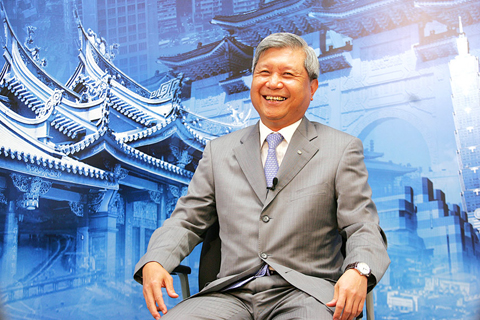Acer Inc (宏碁), the world’s third-largest PC maker, will comply with a Chinese government order for all computers sold in the country to include anti-pornography software, spokesman Henry Wang (汪島雄) said.
“The company has noted the regulations and we will meet them,” Wang said by phone yesterday.
He declined to say if the Taipei-based company had already installed the “Green Dam-Youth Escort” software on its products in China.

PHOTO: BLOOMBERG NEWS
All personal computers sold in China from today were to have to include the software as part of government efforts to curb access to pornographic content on the Internet, a May 19 statement by China’s Ministry of Industry and Information Technology said.
However, later yesterday China’s Xinhua new agency reported that the implementation of the controversial policy would be delayed.
Hewlett-Packard Co (HP), the world’s largest PC maker, is seeking additional information and watching developments on the requirements, spokeswoman Pamela Bonney said on Monday.
Dell Inc, the second largest, will “continue to monitor” the situation, spokesman Jess Blackburn said.
Both declined to say whether their companies would adopt the software.
Meanwhile, a California company that says its software was illegally used in Beijing’s new Internet filter threatened unspecified legal action.
Solid Oak Software Inc of Santa Barbara said it had written to Dell, HP and other producers advising them not to install the software on the grounds that it contained illegally obtained intellectual property.
Solid Oak said it was appointing lawyers to represent it in China and would be “moving forward legally” today, company spokeswoman Jenna DiPasquale said in an e-mail.
“I cannot say at this time what specific legal action we plan to take,” DiPasquale said.
US trade officials, industry and free-speech groups have appealed to Beijing to revoke its order, which requires suppliers to pre-install the software or include it on a disk with each PC made for sale in China.
Washington said the order, issued abruptly in May, might violate Beijing’s WTO free-trade pledges. American officials have cited warnings by computer experts that the software could cause security problems for users.
The US embassy in Beijing did not immediately respond to requests for information on the status of talks with Chinese officials.
Industry groups have received no response to a letter sent last week by 22 US, European and Japanese groups to Chinese Premier Wen Jiabao (溫家寶), appealing to him to scrap the order, said one of the signers, Joerg Wuttke, president of the EU Chamber of Commerce in China.
“We hope we receive feedback,” Wuttke said. “We also hope this decision can be postponed, because there are so many uncertainties in connection with the software.”

MULTIFACETED: A task force has analyzed possible scenarios and created responses to assist domestic industries in dealing with US tariffs, the economics minister said The Executive Yuan is tomorrow to announce countermeasures to US President Donald Trump’s planned reciprocal tariffs, although the details of the plan would not be made public until Monday next week, Minister of Economic Affairs J.W. Kuo (郭智輝) said yesterday. The Cabinet established an economic and trade task force in November last year to deal with US trade and tariff related issues, Kuo told reporters outside the legislature in Taipei. The task force has been analyzing and evaluating all kinds of scenarios to identify suitable responses and determine how best to assist domestic industries in managing the effects of Trump’s tariffs, he

TIGHT-LIPPED: UMC said it had no merger plans at the moment, after Nikkei Asia reported that the firm and GlobalFoundries were considering restarting merger talks United Microelectronics Corp (UMC, 聯電), the world’s No. 4 contract chipmaker, yesterday launched a new US$5 billion 12-inch chip factory in Singapore as part of its latest effort to diversify its manufacturing footprint amid growing geopolitical risks. The new factory, adjacent to UMC’s existing Singapore fab in the Pasir Res Wafer Fab Park, is scheduled to enter volume production next year, utilizing mature 22-nanometer and 28-nanometer process technologies, UMC said in a statement. The company plans to invest US$5 billion during the first phase of the new fab, which would have an installed capacity of 30,000 12-inch wafers per month, it said. The

Taiwan’s official purchasing managers’ index (PMI) last month rose 0.2 percentage points to 54.2, in a second consecutive month of expansion, thanks to front-loading demand intended to avoid potential US tariff hikes, the Chung-Hua Institution for Economic Research (CIER, 中華經濟研究院) said yesterday. While short-term demand appeared robust, uncertainties rose due to US President Donald Trump’s unpredictable trade policy, CIER president Lien Hsien-ming (連賢明) told a news conference in Taipei. Taiwan’s economy this year would be characterized by high-level fluctuations and the volatility would be wilder than most expect, Lien said Demand for electronics, particularly semiconductors, continues to benefit from US technology giants’ effort

‘SWASTICAR’: Tesla CEO Elon Musk’s close association with Donald Trump has prompted opponents to brand him a ‘Nazi’ and resulted in a dramatic drop in sales Demonstrators descended on Tesla Inc dealerships across the US, and in Europe and Canada on Saturday to protest company chief Elon Musk, who has amassed extraordinary power as a top adviser to US President Donald Trump. Waving signs with messages such as “Musk is stealing our money” and “Reclaim our country,” the protests largely took place peacefully following fiery episodes of vandalism on Tesla vehicles, dealerships and other facilities in recent weeks that US officials have denounced as terrorism. Hundreds rallied on Saturday outside the Tesla dealership in Manhattan. Some blasted Musk, the world’s richest man, while others demanded the shuttering of his